Last week I delivered a leadership for librarians day in association with ‘CILIP in Kent’ for a group of library staff from higher and further education institutions and schools. You can see tweets from the event if you use the hashtag #leadlib. It felt good to front a course which had evolved significantly since its pilot version, delivered last year in Cambridge and, more importantly, to which attendees really responded.
The Pilot
I delivered the pilot, entitled ‘Tomorrow’s Library Leaders’, alongside Jo Alcock as part of Cambridge University’s Librarians in Training programme following an invitation from my old mate (and co-editor of my first academic book Personalising Library Services in Higher Education) Libby Tilley. As I felt that first leadership day was really a ‘try out’ for new material I didn’t seek payment and was instead just grateful for both the opportunity and the experience.
The day went pretty well and Jo and I enjoyed working together, having a very similar take on the content and the need for many practical activities interspersed with the theory. Jo and I brought different and complementary elements to the table. She is more evaluative and reflective than I am and her input on this score was particularly valuable.
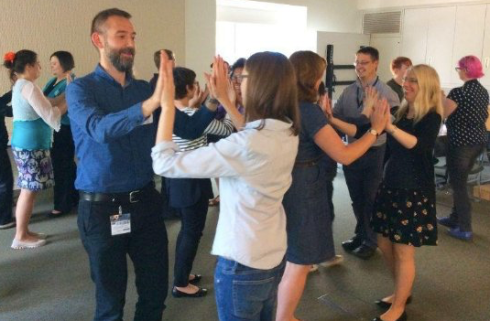
Feedback to the pilot day was largely positive, however there were some requests for more practical advice and reflection time and for opportunities for delegates to learn about their own leadership styles preferences. However the comment that most stayed with me after the day was that there wasn’t much material on what sort of leadership the library sector needs today. It was something that Jo and I had discussed and there was some consideration of this aspect during the day but probably not anywhere near enough so this criticism was fair and helpful.
For myself I felt that the section in which I detailed my personal leadership experiences on this first day was rather plonked into proceedings and was probably too self-deprecating (I sometimes find it easier to present a caricature of myself that some people understandably but mistakenly read as the full picture). I also felt that this material was too much about me and not relatable or useful enough as a result. ‘Next time’, I remember thinking, ‘this section will go’.
I also felt that there just weren’t enough of what I suppose you could call ‘penny dropping’ moments – those moments when you have said something new, provoking or truly insightful which your audience really and truly connects with. However, you can’t just manufacture these. They have to be authentic, grounded in the material, surprising and pitched just right.
So how to improve the course? For one thing I knew that I would need to read (and watch) a lot more material and to personally reflect on leadership more. Although I didn’t think of it at the time, my own leadership experiences between that day and its second iteration would also naturally produce some new material…
The Revised Course
Over the next 12 months due to the burgeoning interest in Higher Education in UX research methods and my involvement in the UX in Libraries movement and related innovation projects and training, I rarely thought about the leadership course. The exceptions were those moments when I was finding my personal leadership approaches either lacking or needing refining. It was at those times that I reflected on how important it is for those who are leading to take the time to reflect on their role and I thought of the course sitting there ‘waiting in the wings’.
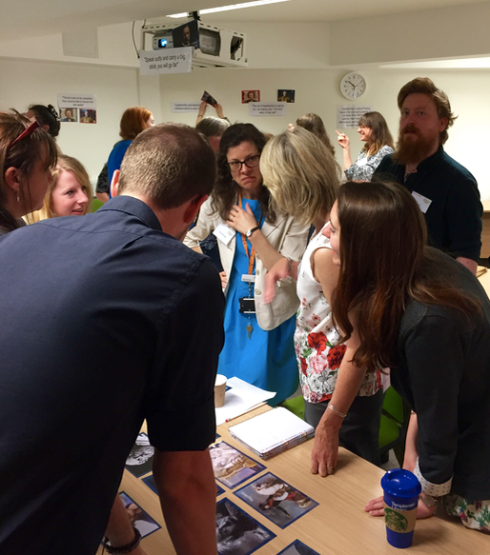
When I got around to looking at the course again I already knew that the first thing I wanted to add in was Simon Sinek’s Golden Circle because of the impact it has had on me. I am convinced that his ‘Start with Why’ approach can help leaders and more generally libraries in all sorts of situations. Specifically I think it can help librarians to better position themselves by placing their glorious passion and commitment to what they do at the very forefront of their offering. Why librarians are librarians should form the start of the conversations we have with our users, with our non-library colleagues, and, well, everyone else.
I was also keen to get some Jobs in. Yes, Steve. A bit of a cliché for a leadership course perhaps, so much so that I joked during my course that it is actually a legal requirement to include Steve Jobs in every leadership course. But I’m not simply jumping on a bandwagon with Jobs here. Whatever you think of him and his methods, I believe that Steve really and truly understood leadership and exploited that understanding to the max. In this way he makes for a fascinating case study. Yes there are darker shades to some of his approaches but there is also much to admire: unassailable conviction and integrity and, of course, inspiration. Incidentally it was inspiration that was cited by course attendees as one of four most prized qualities of a leader. The other three, I was intrigued to discover, were leaders who were inclusive, empowering and courageous. Got it?
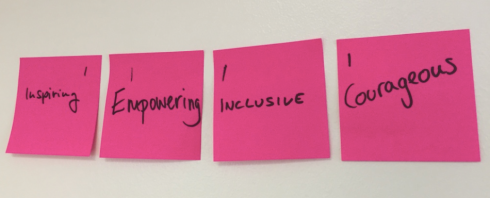
Two new course elements, a leadership styles assessment and a leadership challenge adapted from Kouzes and Posner offered attendees a clear idea of their preferences and, more importantly, their weaknesses. Once identified these weaknesses formed the basis of a personal leadership development plan that attendees began to work on during the course and which I truly hope will make an impact beyond it. Like many of the attendees I would have found it hard to sit down and fill it in there and then during the course but that is also precisely why I was so keen to take this approach. It is hard for most people to spend time investing solely in themselves and reflecting on how they might improve and if I did not make the time within the course it felt more likely that time would not be made after the course.
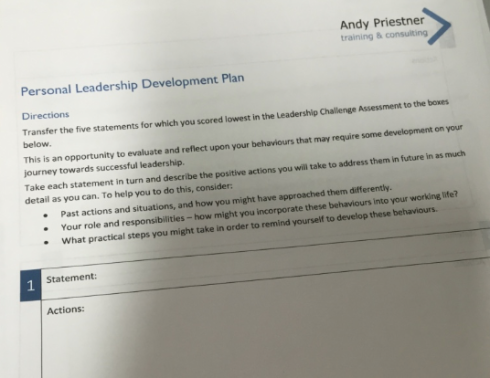
I was also pleased to refute the commonly held view that there are not any specific leadership lessons for librarianship. I detailed what I considered to be key library leader attributes, making a strong case for certain qualities that (in my experience) are often missing: strong marketing and advocacy skills; agility and flexibility; collaboration; bravery; an ability to simplify complexity; and the importance of selling a compelling vision.
It was an odd time to hold a leadership course given the current absence of leadership in UK government and the rawness still felt in response to Brexit, but the day was nevertheless tinged with positivity, after all we reached agreement on what it meant to be a leader and personal leadership development journeys were begun.
I am never content with anything for long. I suppose it could be considered a personal failing, but when it comes to my training courses it’s definitely a good thing as it prompts me to continuously develop materials. In the case of this leadership day, although I now consider it much improved, I think it requires at least one or two more practical elements as well as a more engaging and interactive section to introduce different leadership styles.
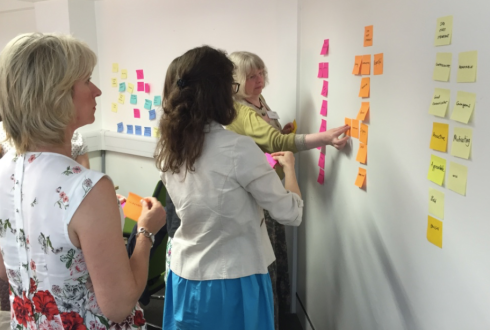
Designing this course has been hard work and will continue to be hard work as I prepare to deliver it again. Which itself puts me in mind of Vince Lombardi’s famous leadership quote: ‘Leaders aren’t born, they are made. And they are made just like anything else through hard work. That’s the price we have to pay to achieve that goal or any goal.’
